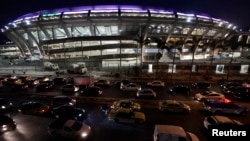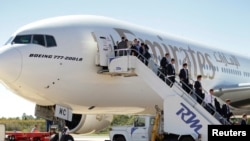RIO DE JANEIRO —
All but diehard fans of international soccer could be forgiven for not knowing, much less caring, about the Confederations Cup, a two-week tournament that kicks off in Brazil on Saturday.
For 200 million Brazilians, though, the competition is the first in a series of big events that will say a lot about their country, their first-world ambitions and the government's ability, amid fading confidence in Latin America's biggest economy, to deliver on the promise of a Brazil transformed.
The Confederations Cup, an eight-team competition, will serve as a dress rehearsal for two far bigger shows on Brazilian soil - the 2014 World Cup and the 2016 Summer Olympics.
When it won rights to host those events, Brazil was on a tear. They were supposed to showcase a country that in the century's first decade channeled booming export revenue, soaring consumer demand and ambitious social programs into economic growth that catapulted over 30 million people out of poverty.
But now, at showtime, Brazil has lost its luster.
Economic stagnation, rising inflation and a spike in the sorts of violent crimes that were supposed to recede with prosperity are reviving questions, asked here for decades, about how far Brazil has actually traveled on the difficult path from emerging nation into the ranks of developed countries.
As the Confederations Cup gets going, in six of the dozen cities that will host the World Cup, many Brazilians fear visitors will see anything but a country in full bloom.
“We've been eating baloney and burping caviar,” says Juca Kfouri, a prominent sportswriter and commentator, using a local expression for pretense outpacing reality. “These events are now upon us and this is the same old Brazil.”
Sports fans, the government says, can rest assured.
Naysayers, after all, routinely predict disaster before every major sporting event, be it here or in the world's richest countries. They quibble over everything from Olympic mascots to the design of the World Cup ball.
And the show, invariably, proceeds.
“We have no fears of not being ready,” Aldo Rebelo, Brazil's sports minister, said this week, citing ongoing work to finish remaining World Cup venues by a December deadline and expand crowded airport terminals in time to welcome visitors.
Lost opportunity
Still, critics are outraged by cost overruns, construction delays, a perceived lack of transparency and quickly rising prices for tickets and tourism related to the events.
Work at the MaracanIa, the Rio stadium that for half a century was one of the temples of global soccer, took so long that it will host Confederations Cup games with its exterior and much of the surrounding area still a construction site.
Then there's the questionable practicality of new stadiums in far-flung cities, including the farm hub of Cuiaba and the Amazonian capital of Manaus, that don't even have top-tier soccer teams let alone a place on the concert circuit organizers say will ensure they don't morph into white elephants.
In a recent report, the Federal Accounts Tribunal, an agency that probes public spending, calculated that World Cup costs have already exceeded an initial budget of about 24 billion reais ($11.2 billion) by at least 15 percent.
Organizers for the Olympics, to be held in and around Rio, haven't even disclosed an official budget, though they concede it will cost far more than the 29 billion reais estimated when Rio bid for the games.
What bothers many the most is that Brazil, despite lofty ambitions early on, gave up on many of the grand designs it proposed for the big events - from a bullet train between Sao Paulo and Rio to rapid transit systems in smaller cities.
Romario, the superstar striker who won the 1994 World Cup with Brazil and is now a legislator in Congress, has taken to the assembly floor to decry squandered time and resources.
“Brazilians will be disappointed to have lost yet another good opportunity to make this country a better place to live,” he predicted recently.
Undermined confidence
The assessment comes as a spate of bad news undermines much of the confidence that Brazil had just a few years ago.
After posting economic growth of 7.5 percent as recently as 2010, the country last year grew by just 0.9 percent. A worsening outlook for 2013, combined with rising inflation and a deterioration of public finances, last week led ratings agency Standard & Poor's to warn it could downgrade Brazil's debt.
The woes caused President Dilma Rousseff, who has enjoyed high approval ratings since she took office in 2011, to slip in two recent polls. Meanwhile, a series of high-profile rapes and assaults in Rio and Sao Paulo, where violent crimes have spiked by more than 10 percent in three years, is prompting citizens to wonder whether security is slipping, too.
Yet Brazil is unlikely to don a dour face for visitors.
The government recently launched an advertising campaign that asked Brazilians to flaunt their diversity, creativity and hospitality and “show what it means to be Brazilian”.
Globo, the dominant TV network, has run a series of spots during a weekly news show illustrating problems that foreigners face when they arrive - from confusing signs at airports to limited foreign language skills among Brazilians to aggressive street vendors who swarm them at popular tourist attractions.
As it lays out the welcome mat, some fear Brazil is slamming the door on itself.
High demand for hotel rooms and airline seats means many locals can't afford to travel during the events. And the need to recoup costly stadium investments means high ticket prices that exclude workaday soccer fans from enjoying the national sport.
After the re-inauguration of the MaracanIa earlier this month, many longtime visitors remarked on the homogenous, mostly white, audience and a staid public compared with the raucous crowds of games past.
TostIao, a legendary forward who is now a columnist for the Folha de S. Paulo newspaper, after the game lamented “the elitization of soccer across Brazil”.
For 200 million Brazilians, though, the competition is the first in a series of big events that will say a lot about their country, their first-world ambitions and the government's ability, amid fading confidence in Latin America's biggest economy, to deliver on the promise of a Brazil transformed.
The Confederations Cup, an eight-team competition, will serve as a dress rehearsal for two far bigger shows on Brazilian soil - the 2014 World Cup and the 2016 Summer Olympics.
When it won rights to host those events, Brazil was on a tear. They were supposed to showcase a country that in the century's first decade channeled booming export revenue, soaring consumer demand and ambitious social programs into economic growth that catapulted over 30 million people out of poverty.
But now, at showtime, Brazil has lost its luster.
Economic stagnation, rising inflation and a spike in the sorts of violent crimes that were supposed to recede with prosperity are reviving questions, asked here for decades, about how far Brazil has actually traveled on the difficult path from emerging nation into the ranks of developed countries.
As the Confederations Cup gets going, in six of the dozen cities that will host the World Cup, many Brazilians fear visitors will see anything but a country in full bloom.
“We've been eating baloney and burping caviar,” says Juca Kfouri, a prominent sportswriter and commentator, using a local expression for pretense outpacing reality. “These events are now upon us and this is the same old Brazil.”
Sports fans, the government says, can rest assured.
Naysayers, after all, routinely predict disaster before every major sporting event, be it here or in the world's richest countries. They quibble over everything from Olympic mascots to the design of the World Cup ball.
And the show, invariably, proceeds.
“We have no fears of not being ready,” Aldo Rebelo, Brazil's sports minister, said this week, citing ongoing work to finish remaining World Cup venues by a December deadline and expand crowded airport terminals in time to welcome visitors.
Lost opportunity
Still, critics are outraged by cost overruns, construction delays, a perceived lack of transparency and quickly rising prices for tickets and tourism related to the events.
Work at the MaracanIa, the Rio stadium that for half a century was one of the temples of global soccer, took so long that it will host Confederations Cup games with its exterior and much of the surrounding area still a construction site.
Then there's the questionable practicality of new stadiums in far-flung cities, including the farm hub of Cuiaba and the Amazonian capital of Manaus, that don't even have top-tier soccer teams let alone a place on the concert circuit organizers say will ensure they don't morph into white elephants.
In a recent report, the Federal Accounts Tribunal, an agency that probes public spending, calculated that World Cup costs have already exceeded an initial budget of about 24 billion reais ($11.2 billion) by at least 15 percent.
Organizers for the Olympics, to be held in and around Rio, haven't even disclosed an official budget, though they concede it will cost far more than the 29 billion reais estimated when Rio bid for the games.
What bothers many the most is that Brazil, despite lofty ambitions early on, gave up on many of the grand designs it proposed for the big events - from a bullet train between Sao Paulo and Rio to rapid transit systems in smaller cities.
Romario, the superstar striker who won the 1994 World Cup with Brazil and is now a legislator in Congress, has taken to the assembly floor to decry squandered time and resources.
“Brazilians will be disappointed to have lost yet another good opportunity to make this country a better place to live,” he predicted recently.
Undermined confidence
The assessment comes as a spate of bad news undermines much of the confidence that Brazil had just a few years ago.
After posting economic growth of 7.5 percent as recently as 2010, the country last year grew by just 0.9 percent. A worsening outlook for 2013, combined with rising inflation and a deterioration of public finances, last week led ratings agency Standard & Poor's to warn it could downgrade Brazil's debt.
The woes caused President Dilma Rousseff, who has enjoyed high approval ratings since she took office in 2011, to slip in two recent polls. Meanwhile, a series of high-profile rapes and assaults in Rio and Sao Paulo, where violent crimes have spiked by more than 10 percent in three years, is prompting citizens to wonder whether security is slipping, too.
Yet Brazil is unlikely to don a dour face for visitors.
The government recently launched an advertising campaign that asked Brazilians to flaunt their diversity, creativity and hospitality and “show what it means to be Brazilian”.
Globo, the dominant TV network, has run a series of spots during a weekly news show illustrating problems that foreigners face when they arrive - from confusing signs at airports to limited foreign language skills among Brazilians to aggressive street vendors who swarm them at popular tourist attractions.
As it lays out the welcome mat, some fear Brazil is slamming the door on itself.
High demand for hotel rooms and airline seats means many locals can't afford to travel during the events. And the need to recoup costly stadium investments means high ticket prices that exclude workaday soccer fans from enjoying the national sport.
After the re-inauguration of the MaracanIa earlier this month, many longtime visitors remarked on the homogenous, mostly white, audience and a staid public compared with the raucous crowds of games past.
TostIao, a legendary forward who is now a columnist for the Folha de S. Paulo newspaper, after the game lamented “the elitization of soccer across Brazil”.








